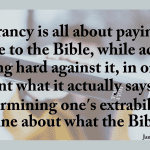I have been blogging quite a bit about inerrancy, as you may have noticed. That is mostly because I have been having a conversation with a colleague about the topic. I will share some excerpts from that conversation in the next couple of days. Today, I want to share some background of my own connection with biblical, as well as links to others who’ve been blogging about the subject lately.
I abandoned inerrancy when I realized that I was defending my doctrine about scripture from counterevidence that was offered by scripture itself. I can’t imagine a more inherently self-defeating stance to adhere to, since, if the aim is to defend scripture as the ultimate authority, recognizing that scripture is not being allowed to exert its authority over your view of it should lead immediately to its abandonment. That seems to me the heart of the matter, and that is my challenge to biblical inerrantists: Choose this day which you will serve, the Bible or your doctrine about the Bible.
Fred Clark pointed out in a recent post that the conservative white Protestant churches that are most likely to adhere to biblical inerrancy are also, according to a recent Pew survey, the least likely to believe that their society has a responsibility to care for refugees. This leads Fred to offer a biblical-style indictment. Here is a sample:
[T]he more white Americans read the Bible, the less they respect it. Any of it — the books of Moses, the prophets, the wisdom literature, the Gospels, the epistles, the Apocalypse. Every section, every chapter, every page.
For white Americans, the more you go to church, the less you respect Jesus Christ. The less you follow Christ. The less you know Christ. The less you recognize Christ when he’s standing right in front of you.
Truly I tell you, the atheists and the unaffiliated are going into the kingdom of God ahead of you…
What Wade Burleson had to say about Paige Patterson and the Southern Baptists is in a similar vein.
Of related interest, see Chuck McKnight’s post about whether inerrancy has become more important than orthodoxy. I don’t necessarily subscribe to either, but it is interesting to see what happens when the two bump up against one another and find themselves in tension in a particular individual or community’s belief system.
See too Steve Wiggins’ recent post about a recent book on 1 Enoch and the Watchers. He writes:
Even when reading through the Bible as a child, the Genesis 6 episode caught me off guard. The story isn’t highlighted in children’s Bibles, and the way it’s told in Hebrew leaves a lot of ambiguities in the adult reader’s mind. It’s almost as if this brief account is being kept deliberately obscure. The Good Book drops this bomb then blithely goes on its way without mentioning it again. This episode reminds us just how little the Bible clarifies. It wasn’t written to be the “inerrant word of God,” and those heady days just after Eden were full of stories that it never bothered to tell. The Watchers, meanwhile, made their way into popular culture because the silence of Scripture allows readers to fill in the blanks with either angels or demons.
In another post, about end-times focused Christians who manage to read popes into the Bible, Steve writes:
The iconic role of Holy Writ in secular society is greater than many people suppose. “The Bible says” is practically gospel because few people will check it out. I knew from my conversations with clergy, even as a teen, that few ministers had actually read their own foundation document the whole way through. That leaves them vulnerable to the “cloud of unknowing” whether something is biblical or not. The only way to find out is to sit down with the tome and start reading.
Finally, let me also highlight James Spinti’s post about a book which argues that Pentecostals cannot subscribe to inerrancy.













